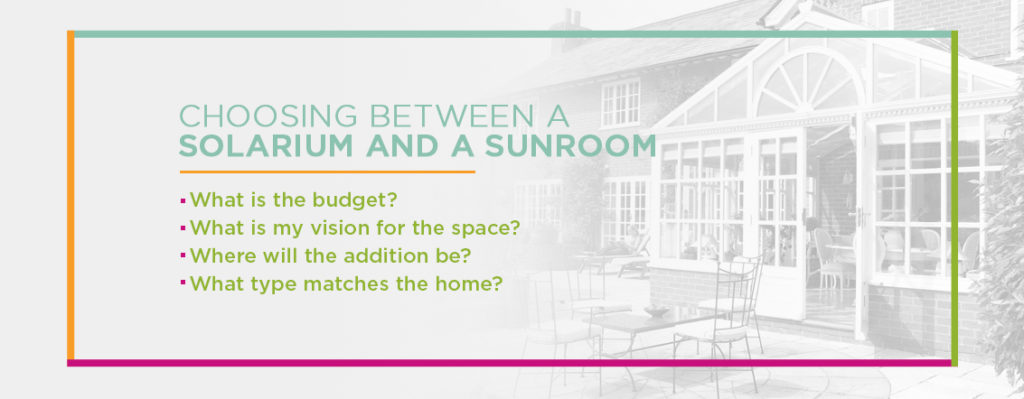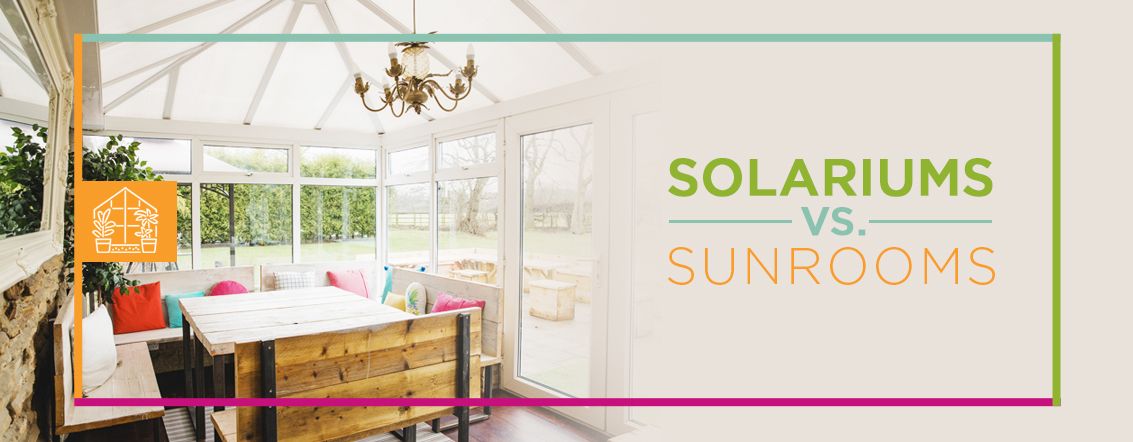When you’re pursuing an addition to your home, you want to be sure you’re making the right decision for your investment. Solariums and sunrooms are two excellent options to consider.
Imagine walking into your new addition and watching the sunrise without the chill of an autumn morning. Or think about curling up with a book on a summer evening and reading until the sunsets. Both solariums and sunrooms afford these opportunities, but their distinct characteristics may make one more appropriate for your project.
What Is a Solarium?
A solarium is a type of sunroom with glass walls and a glass ceiling. The amount of glass in a solarium gives it an expansive view, and you can typically heat or cool the space with a separate room unit. Solariums come in a variety of ceiling configurations, so you can pick a style that matches the look of your home.
- Victorian style: A Victorian solarium roof combines triangular and rectangular glass panes to create a rounded, yet angular, shape. This style emulates the round angles and gabled roofs common in Victorian architecture.
- Georgian style: Georgian solarium roofs have a simple rectangular construction, much like the roofing in a Georgian home. In this style, rectangular glass panes meet at a central middle point and adjoin to a triangular side section.
- Cathedral style: The cathedral style uses a clean, gabled pattern with two sloped sides meeting at a central point. This construction allows solarium windows to stretch from the floor to the peak of the roof.
- Straight-eave style: A straight-eave roof style is flat or semi-slanted across the solarium roof. Though simple, this design works well with a variety of home styles.
- Curved-eave style: A curved-eave solarium has a distinctive downward bend as it transitions from the roof to the walls. This style accents many architectural trends with its unique shape.
In addition to these different roof configurations, solariums may feature aluminum or wood material options. You can customize a solarium with insulated or shaded glass to tailor it to your goals for the space. The roof style, materials, size and location of a solarium all factor into how much it may cost.
Learn More About Our Product Offerings
Pros of Solariums
The advantages of solariums include the many ways you can enjoy the space in your home. Consider the following benefits.
- Clear views to the outdoors: The glass ceiling in a solarium creates minimal obstruction between you and the environment beyond the glass, giving you a unique perspective to the weather and outdoors. You can enjoy a rainstorm from the comfort of a lounge chair or watch the summer sunset without a single bug.
- Plentiful natural light: Sunlight seeps through the windows in a solarium and adds warmth to the room. You can soak up the rays in a climate-controlled environment year-round. The sunshine also makes a solarium the perfect place to grow plants while protecting them from the weather.
- Protection from the elements: Whether you want to stargaze without the chill of dusk or enjoy a view during a snowstorm, solariums keep you protected. With a solarium, you can enjoy everything you love about the outdoors, while removing everything you don’t.
- Increased home value: Solariums set your home apart from others, and they increase your resale value. According to HomeAdvisor, adding a solarium can increase your home value by 49% of the project price.
Cons of Solariums
Like any home renovation project, solariums may have a few downsides. The disadvantages of solariums include the following.
- Visible roof debris: On a normal roof, you can only see debris in specific places from the outdoors. The glass roof in a solarium shows everything that lands on it. For this reason, a solarium may require more roof cleanup than a sunroom. You may be able to mitigate this cleanup depending on the roof shape you choose.
- Higher construction costs: Depending on the materials you use, a solarium may be more expensive to build than a sunroom.
- Warmth in the summer: A typical roof helps shield your home from the summer sun and heat, but the glass in a solarium roof does not offer the same amount of protection. Though your solarium may get warm in the summer, you can address the situation with ventilation openings, tinted windows and blinds.
What Is a Sunroom?
A sunroom is extra living space attached to your home with a normal roof and glass or screen walls. Your sunroom may have a skylight to let in additional sunshine, or it may have a solid roof.
It’s possible to build sunrooms into several different types of rooms. For example, you could enclose a deck, convert a sitting room or transform a kitchen into a sunroom. You can also tailor the shape of a sunroom to match your home’s design and look like a natural extension of the space. The cost of a sunroom depends on its size and the materials used.
Pros of Sunrooms
The advantages of a sunroom include the following.
- Lower construction costs: In general, adding a sunroom to your home may cost less than adding a solarium. The absence of a glass roof allows you to work with affordable roofing materials that match your home.
- Abundant natural light: Sunrooms allow sunshine to pour through glass or screen walls. With this construction, you can enjoy the beauty of the outdoors while the room shields you from bugs and the weather.
- Extreme versatility: You can use a sunroom however you’d like. Whether you want to turn your sunroom into an extra dining space, give it a living room feel or use it like a patio, the room is flexible enough to adapt.
Cons of Sunrooms
Before you commit to your new addition, consider some of the disadvantages of sunrooms.
- Less insulation: Lower-cost materials may provide poor insulation in your sunroom, which could limit the amount of time you can use the space during the year. You can mitigate this issue by working with high-end insulated materials and a knowledgeable designer.
- Semi-restricted view: Although a sunroom is peaceful, it may not capture the same grandeur as a solarium’s glass ceiling. Sunrooms are similar to a covered porch in that you have a solid overhang surrounded by an open area.
- Potential for increased energy use: Typical sunrooms aren’t as insulated as a four-season room or solarium. They can let in cooler air in the winter and warmer air in the summer, which may increase your energy costs. You can address this issue through the types of windows and roofing you use.
Learn More About Our Product Offerings
Choosing Between a Solarium and a Sunroom

Several factors may influence your decision between a solarium and a sunroom. Consider the following questions before you make your choice.
- What is the budget? In general, a lower budget may be better suited to a sunroom and a higher budget to a solarium. However, you can customize each type to fit a variety of budgets. Consider several configuration options to get the full scope of what you can do.
- What is my vision for the space? If you have an idea of how you’d like to use your space, keep it in mind when making your decision. For a room that feels more like a living area, consider a solarium. For a patio-like space with extra protection, opt for a sunroom.
- Where will the addition be? The location of your addition may make a difference in its aesthetics and function. Consider whether you’re placing the addition in the path of the sunrise and sunset, how much space you’ll have and how much privacy you want.
- What type matches the home? Consider whether you’re looking for something streamlined and functional or something opulent. Customization can help you match either a sunroom or solarium to your goals and home architecture.
Trust Maryland Sunrooms for Your Sunroom or Solarium Installation
When you work with Maryland Sunrooms, we’ll take care of the entire building process. From our high-quality products to seamless construction, you can trust us to build your new addition with precision. For more information about your new sunroom or solarium, contact us today!

Julie Shetter is the Marketing Director at Maryland Sunrooms. She has over a decade of experience in the home improvement and sunroom industry.



